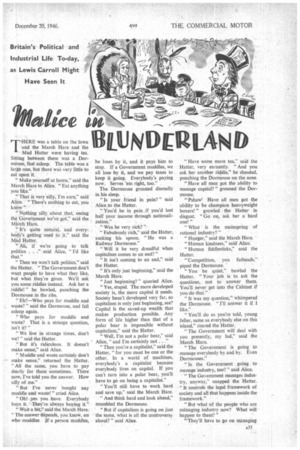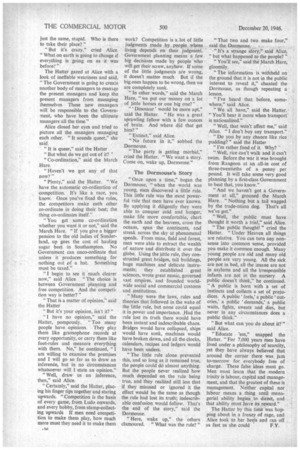alice tat
Page 37

Page 38

If you've noticed an error in this article please click here to report it so we can fix it.
THERE HERE was a table on the lawn and the March Hare and the Mad Hatter were having tea. Sitting between them was a Dormouse, fast asleep. The table was a large one, but there was very little to eat upon it. .
"Make yourself at home," said the March Hare to Alice. "Eat anything you like."
That is very silly, I'm sure," said Alice. "There's nothing to eat, you k ;lbw " • " Nothing silly about that, seeing the Government we've gotsaid the March Hare.
"It's quite natural, and everybOily's getting used to it." said the Mad Hatter.
" Ah, if we're going to talk politics . . ." said Alice, "I'd like that" 'Then we won't talk politics," said the Hatter. "The Government don't want people to have what they like, but what they're given. We'll ask you some riddles-instead. Ask her a riddle!" he bawled, punching the Dormouse in the ribs.
"Eh?—Who pays for muddle and waste?" said the Dormouse, and fell asleep again.
"Who pays for muddle and waste? That is a strange question, isn't it?"
"We live in strange times, don't we? " said the Hatter.
" But it's ridiculous. It doesn't make sense," said Alice.
"Muddle and waste certainly don't make sense," returned the Hatter. "All the same, you have to pay dearly for them sometimes. There now, I've told you the answer. How silly of me."
"But I've never bought any muddle and waste! " cried Alice.
"Oh yesyou have. Everybody buys it. They're always buying it."
"Wait a bit,'".said the March Hare. "The answerdepends, you know, on who muddles: if a person muddles, he loses by it, and it pays him to stop. If a Government muddles, we all lose by it, and we pay taxes to keep it going. Everybody's paying now. Serves 'em right, too."
The Dormouse groaned dismally in his sleep.
"Is your friend in pain?" said Alice to the Hatter.
"You'd be in pain if you'd lost half your income through nationalization."
"Was he very rich?"
"Fabulously rich," said the Hatter, sucking his spoon. "He was a Railway Dormouse."
"Will it be very dreadful when capitalism comes to an end?"
"It isn't coming to an end," said the Hatter.
"It's only just beginning," said the March Hare.
"Just beginning?" queried Alice.
"Yes, stupid. The more developed society is, the more capital it needs. Society hasn't developed very far, so capitalism is only just beginning, see? Capital is the saved-up wealth that makes production possible. Any form of life higher than that of a polar bear is impossible without capitalism," said the Hatter.
"Well, I'm not a polar bear," said Alice, "and I'm certainly not . ."
"Then you're a capitalist," said the Hatter, "for you must be one or the other. In a world of machines, everybody's a capitalist because everybody lives on capital. If you can't turn into a polar bear, you'll have to go on being a capitalist."
"You'll still have to work hard and save up," said the March Hare.
"And think hard and look ahead," mumbled the Dormouse.
"But if capitalism is going on just the same, what is all the controversy about?" said Alice. "Have some more tea." said the Hatter, very earnestly. "And you ask her another riddle," he shouted, punching the Dormouse on the nose.
"Have all men got the ability to manage capital?" groaned the Dormouse.
"Pshaw' Have all men got the ability to be champion heavyweight boxers!" growled the Hatter in disgust. "Go on, ask her a hard one!"
"What is the mainspring of rational industry?"
"Hunger," said the March Hare. "Human kindness," said Alice. "Human fiddlesticks," said the Hatter.
"Competition, you fatheads," piped the Dormouse.
"You be quiet," bawled the Hatter. "Your job is to ask the questions, not to answer them. You'll never get into the Cabinet if you do that.
"It was my question.whimpered the Dormouse. "I'll answer it if I like."
"You'll do as you're told, young feller, same as everybody else on this island." roared the Hatter.
"The Government will deal with you presently, my lad," said the March Hare.
"The Government is going to manage everybody by and by. Even Dormouses."
"Is the Government going to manage industry, too?" said Alice.
"The Government manages industry, anyway," snapped the Hatter. "it controls the legal framework of society and all that happens inside the framework.
"But what of the people who are managing industry now? What will happen to them?"
"They'll have to go on managing just the same, stupid. Who is there to take their place?"
"But it's crazy," cried Alice. "What on earth is going to change if everything is going on as it was before'?"
The Hatter gazed at Alice with a look of ineffable weariness and said, "The Government is going to create another body of managers to manage the present managers and keep the present managers from managing themselves. These new managers will be responsible to the Government, who have been the ultimate managers all the time."
Alice closed her eyes and tried to picture all the managers managing each other. "it sounds queer," she said.
" It is queer," said the Hatter "But what do we get out of it? ' "Co-ordination," said the March Hare.
"Haven't we got any of that now?"
"Plenty," said the Hatter. "We have the automatic co-ordination of competition. It's like a race, you know. Once you've fixed the rules, the competitors make each other co-ordinate in doing their best; the thing co-ordinates itself."
"You get some co-ordination whether you want it or not," said the March Hare. "if you give a bigger pension to the old ladies of Sunderland, up goes the cost of hauling sugar beet in Southampton. No Government can unco-ordinate that unless it produces something for nothing out of a hat. Something must be taxed."
"I begin to see it much clearer now," said Alice "The choice is between Government planning and free competition. And the competition way is better?
"That is a matter of opinion," said the Hatter But it's your opinion, isn't it?"
"I have no opinion," said the Hatter, pompously. "Too many people have opinions. They play them like gramophone records at every opportunity, or carry them like foot-rules and measure everything with them. No," he continued, "I am willing to examine the premises and I will go so far as to draw an inference, but in no circumstances whatsoever will I state an opinion."
"Well, draw us an inference, then," said Alice.
"Certainly," said the Hatter, placing his finger tips together and staring upwards. "Competition is the basis of every game, from Ludo onwards, and every hobby, from stamp-collecting upwards If men need competition to make them play, how much more must they need it to make them work? Competition is a lot of little judgments made by people whose living depends on their judgment. Government planning means a few big decisions made by people who will get their screw, anyhow. If sonic of the little judgments are wrong, it doesn't matter much. But if the big ones happen to be wrong, then we are completely sunk.
"In other words," said the March Hare, "we put our money on a lot of little horses or one big one?'
" ' Dinosaur ' would be more apt," said the Hatter. "He was a great sprawling fellow with a few ounces of brain. And where did that get him?"
"Extinct," said Alice.
"No future in it," sobbed the Dormouse.
"The party is getting morbid." cried the Hatter. "We want a story. Come on, wake up, Dormouse."
The Dormouse's Story "Once upon a time," began the Dormouse, "when the world was young, men discovered a little rule. This little rule was the most powerful rule that men have ever known. By applying it diligently they were able to conquer cold and hunger, make life more comfortable, chart the earth and the heavens, cross the oceans, span the continents, and streak across the sky at phenomenal speeds. From mine, field and forest, men were able to extract the wealth of nature and distribute it over the globe. Using the little rule, they constructed great bridges, tall buildings, huge machines and delicate instruments; they established great sciences, wrote great music, governed vast empires, and founded worldwide social and commercial customs and institutions.
" Many were the laws, rules and theories that followed in the wake of the little rule, but none could equal it in power and importance. Had the rule lost its truth there would have been instant and indescribable chaos. Bridges would have collapsed, ships would have sunk, machines would have broken down, and all the clocks, calendars, recipes and ledgers would have been useless.
"The little rule alone prevented this, and so long as it remained true, the people could do almost anything. But the people never realized how much depended on the rule being true, and they realized still less that if they misused or ignored it the effect would be the same as though the rule had lost its truth; indescribable confusion would follow. That's the end of the story," said the Dormouse.
"Here, wake up," the others clamoured. "What was the rule?" "That two and two make four," said the Dormouse.
"It's a strange story," said Alice, "but what happened to the people?"
"You'll see," said the March Hare, gloomily.
" The information is withheld on the ground that it is not in the public interest to reveal it," chanted the Dormouse, as though repeating a lesson.
"I've heard that before, somewhere," said Alice.
"We all have," said the Hatter. "You'll hear it more when transport' is nationalized."
"Well, that won't affect me," said Alice. "I don't buy any transport."
"Do you by any chance like rice pudding?" said the Hatter "I'm rather fond of it. Why?
. " Well, rice can't walk and it can't swim. Before the war it was brought from Rangoon at an all-in cost of three-twentieths of a penny per pound. It will take some very good planning by a first-class Government to beat that, you know."
"And we haven't got a Government at all," groaned the March Hare. "Nothing but a tail wagged by the trade-union dog. That's all we've got."
"Well, the public must have thought it worth a trial," said Alice.
"The public thought!" cried the Hatter. "Under Heaven all things are relative. You can turn any nonsense into common sense, provided you make it common enough. Many young people are old and many old people are very young. All the sick are not in bed, all the insane are not in asylums and all the irresponsible infants are not in the nursery A public doesn't think," he continued. "A public is born with a set of instincts and collects a set of prejudices. A public feels,' a public outcries,' a public demands,' a public Waits, fights, sweats and dies, but never in any circumstances does a public think."
"But what can you do about it?" said Alice.
"Educate 'em," snapped the Hatter. "For 7,000 years men have lived under a philosophy of scarcity, yet they have always believed that around the corner there was jam to-morrow for everybody free of charge. These false ideas must go. Men must learn that the modern trinity is labour, capital and management, and that the greatest of these is management. Neither capital nor labour means a thing until managerial ability begins to direct, and that ability must have its reward."
The Hatter by this time was hopping about in a frenzy of rage, and Alice took to her heels and ran off as fast as she could F.Y.




































































